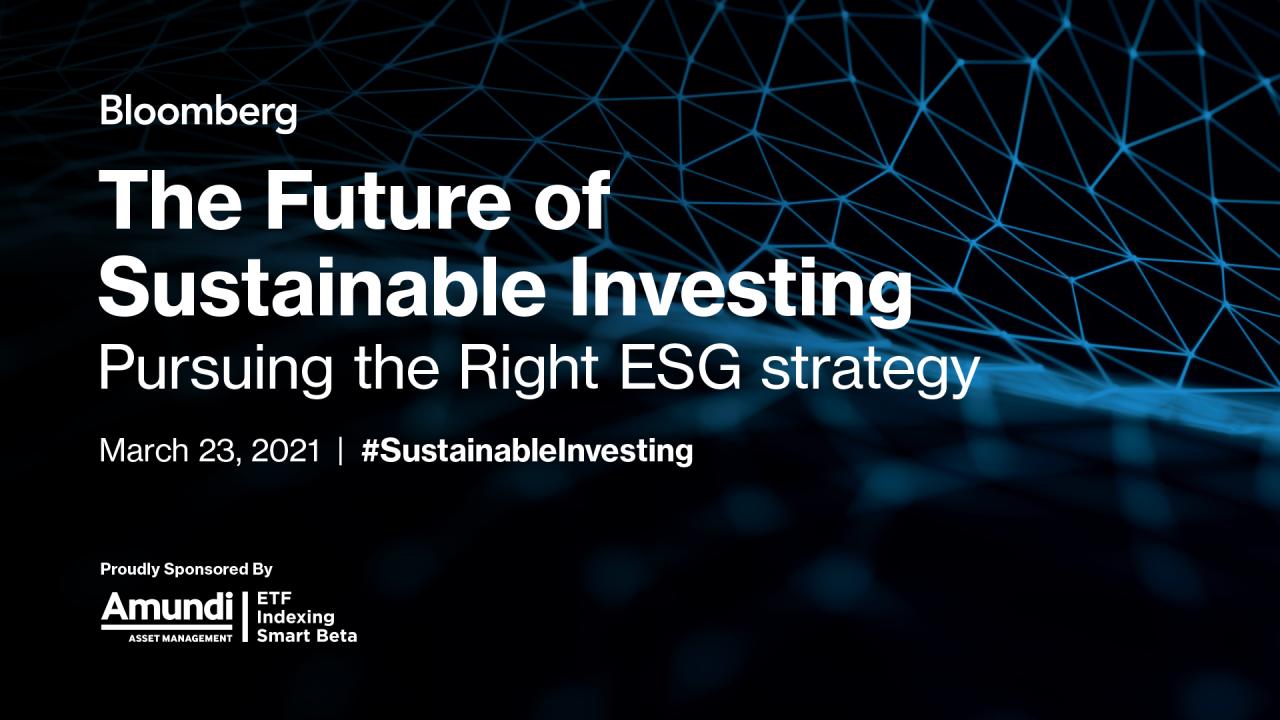
Event Highlights
The Future of Sustainable Investing: Pursuing the Right ESG Strategy
In 2020, flows into global ESG ETFs almost tripled. A Biden presidency and the European Green Deal will likely see this trend continue this year. Investors are now faced with an increasingly diverse choice when it comes to sustainable investments. What factors determine whether an ETF provider is credible within ESG? Can ESG be implemented through passive investments or is it necessary to take an active investment approach?
The recent move toward index tracking funds based on ESG criteria has been welcomed by investors, but are they the best way to get exposure to the green theme?
Speakers:
- Kiran Aziz, Senior Analyst, Responsible Investments, KLP
- Remy Briand, Head of ESG, MSCI
- Emily Kreps, Global Director, Capital Markets Team, CDP
- Wolfgang Kuhn, Director, Financial Sector Strategies, ShareAction
- Fannie Wurtz, Head of ETF, Indexing & Smart Beta, Amundi
- Fabrizio Zumbo, Associate Director, European Asset and Wealth Management Research, Cerulli Associates
Bloomberg moderators:
- Eric Balchunas, Senior ETF Analyst, Bloomberg Intelligence
- Dani Burger, Correspondent, Bloomberg TV
- Athanasios Psarofagis, ETF Analyst, Bloomberg Intelligence
Below are some highlights from the event.
Click here to view the event on demand.
On managing expectations with performance on ESG: Fabrizio Zumbo, Associate Director, European Asset and Wealth Management Research, Cerulli Associates, highlighted recent studies, saying, If we look at funds within ETF, a study on a sample of 745 Europe-based sustainable funds showed that the majority of strategies have done better than non-ESG over one, five and ten years. And sustainable funds and ETF outpaced traditional funds during the market sell-off sparked by the Coronavirus in the first quarter.”
On why there is no one-size-fits-all when it comes to ESG: Fannie Wurtz, Head of ETF, Indexing & Smart Beta, Amundi, said, “There is a vast variety of choice when it comes to ESG, so everyone has to understand what the fund construction is, what it offers and the degree of ESG it’s implementing within its construction. There is first an education and an understanding of what the fund objective is. Also, the concern of our German institutional clients cannot be the same as the retail Italian, Asian or even American client. The more ESG adoption is accelerating, the better it is for the industry. Obviously, there is still concern about the dispersion and the diversity of data. but the more investment will be brought to ESG investing, the more the quality will improve.”
On whether you can be ESG friendly if in an active or passive fund: Wolfgang Kuhn, Director, Financial Sector Strategies, ShareAction, stated, “We look at the performance of voting on ESG issues. Whether you are in a passive or active fund it doesn’t matter when it comes to responsibility because in both we would argue, representing civil society, that it’s your responsibility to vote, to make sure you have the votes and use them.”
On the importance of engagement: “The engagement piece is really critical,” stressed Emily Kreps, Global Director, Capital Markets Team, CDP. “When looking for investments, the transition is key. It’s not just ‘Is this company currently green or not?’ but ‘What is this company doing to transition to a future environment that falls within planetary boundaries?’ So what are they doing to set targets for emissions reductions? That forward-looking component that says, ‘here is a company that is transitioning, that is changing their business and their operations in a way that is going to set them up better for the future.’”
On being active when it comes to engagement: Kiran Aziz, Senior Analyst, Responsible Investments, KLP, said this was key. “Engaging with the company I would say is one of the most important tools you have as an institutional investor. You can still be passively invested but you can play an active role. It’s about putting the expectations to the companies and following up with the progress they have made and seeing if they have credible climate plans. Engaging with the companies is a must and KLP have used that quite actively.”
On the importance of disclosure: Remy Briand, Head of ESG, MSCI, said, “You generally need more disclosure from companies. If you look at scope 3 emissions, which are really important especially in the oil and gas industry, the level of disclosure, the consistency of the disclosure is inadequate. But you can do a lot when you take the disclosed data and you complement it with models. We need to work in parallel. More disclosure and more consistent disclosure from companies and more sophistication from the model in order to still get a useful signal for investment purposes.”
Bloomberg’s The Future of Sustainable Investing: Pursuing the Right ESG Strategy was Proudly Sponsored By

——————————
Join the Conversation: #SustainableInvesting
Instagram: @BloombergLive
LinkedIn: Bloomberg Live
Twitter: @BloombergLive
Interested in more Bloomberg Live virtual events? Sign up here to get alerts.
——————————